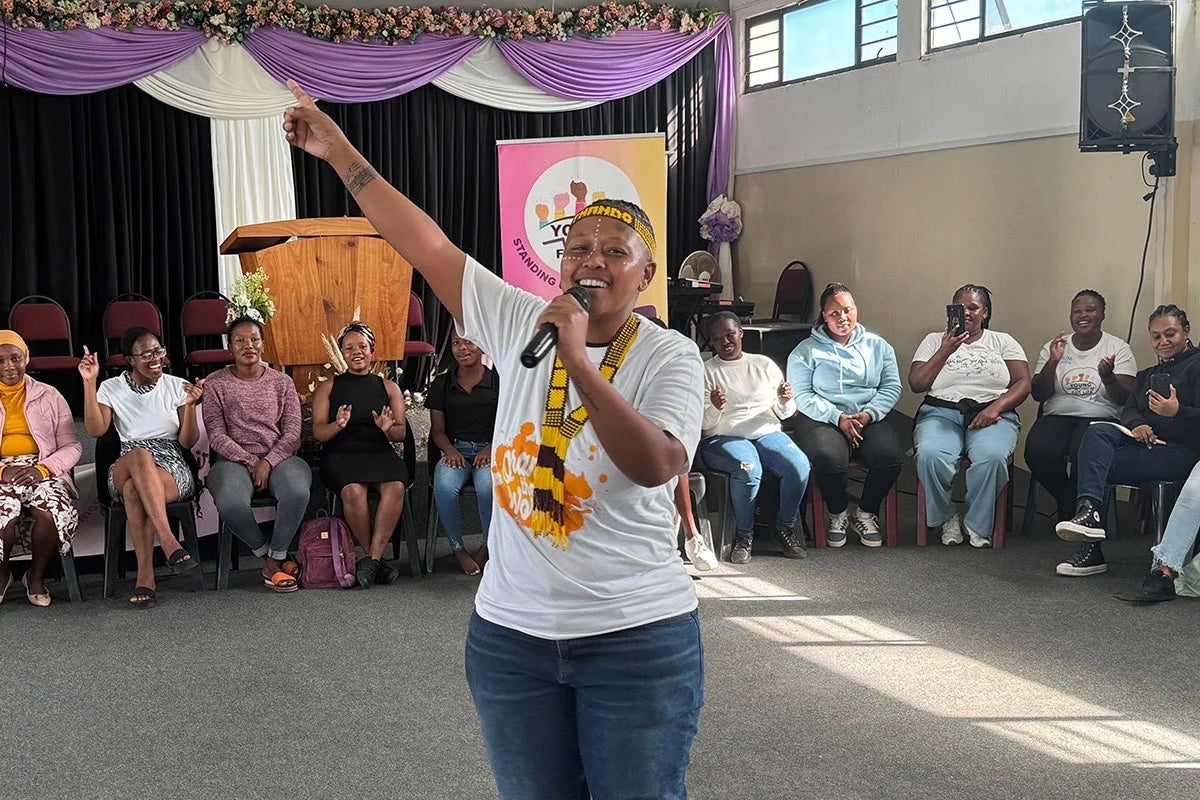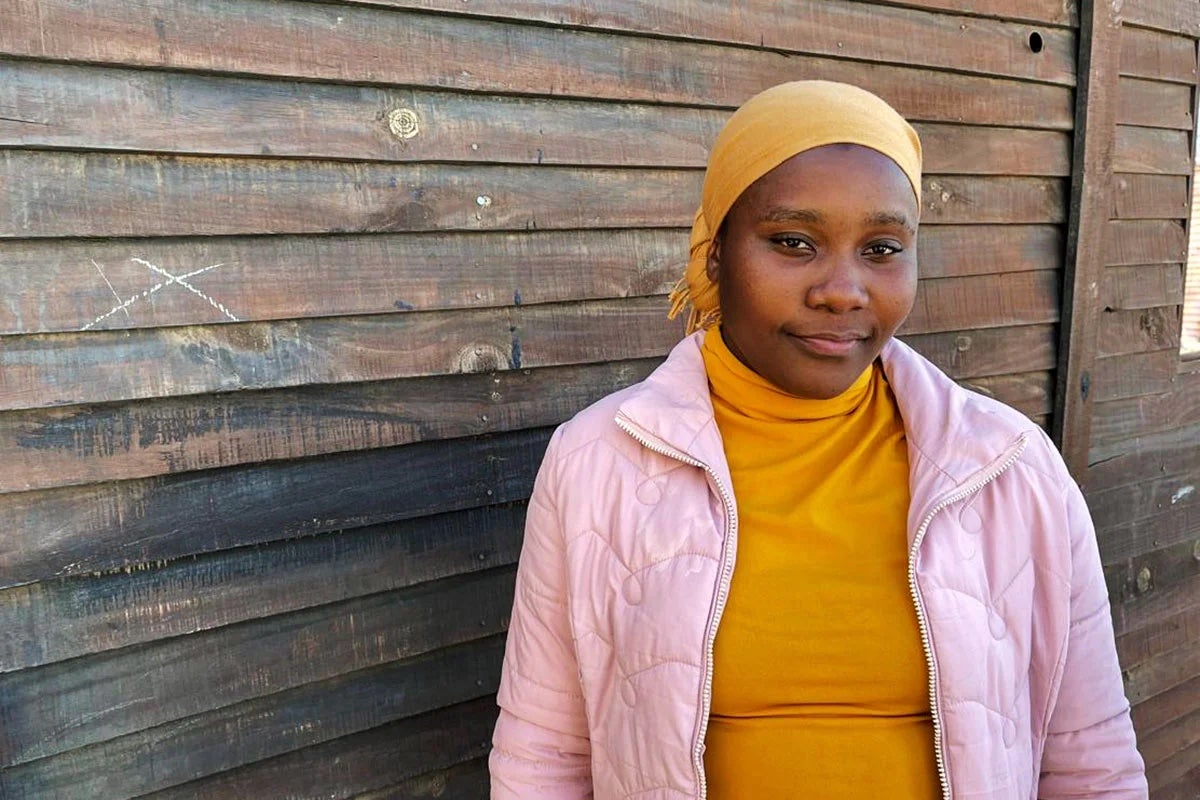‘You have the power to change’ – Young women in South Africa break through stigma and poverty and inspire others
Date:
Listening to Thandolwami Zwelinjani (who prefers to be called Thando) and her peers sing and dance jubilantly, no one would guess the life-threatening challenges they’ve had to overcome. They are from Nomzamo Township in Strand, Cape Town, South Africa, and through the Young Women for Life Movement, they have found ways to break free of the cycle of poverty and violence.

The movement-building programme, supported by the Southern Africa Catholic Bishops Conference and Peace Commission, UN Women and UNAIDS, works with poor and marginalized women and girls, including those affected by gender-based violence and HIV/AIDS.
In South Africa, women and girls are disproportionately affected by HIV. According to the 2023 National Strategic Plan on HIV, STIs and TB, almost two-thirds of all new HIV infections occur in women. Of these, adolescent girls and young women constitute more than a third. Also, across all age groups, the incidence rate of HIV was highest among adolescent girls and young women, and four times higher than in their male counterparts.
Overcoming depression and stigma– Thando’s journey
Thando joined the programme just last year, and it has already had a profound impact on her life. “When I started here, I came to study hospitality. Then I met Phindile Maseko,” shared Thando. She introduced the programme and I felt like I really needed it because some of us were going through a lot that we couldn’t talk about. We thought people would make fun of us.”
Before joining the programme, Thando struggled with depression. She had dropped out of school when her family left her without financial support or direction upon discovering that she was a lesbian. “The programme helped me remember who I was and the things I liked and disliked,” she recalled. She is now a trained chef and makes beautiful beadwork.
A talented singer, Thando has become more confident of her abilities and does not shy away from public performances. “Young Women for Life gave me so much power that I started believing in myself and realized that my passion for singing can become a source of inspiration and power for many girls who were once lost just like me,” she said.
From teen mother to a successful entrepreneur – Gugulethu is an inspiration for girls in her community
Gugulethu Mdoba (affectionately called Gugu), is another shining example of the impact of the programme. “I grew up in a poor family, and I got pregnant when I was 18 years old,” shared Gugu. “It was hard for me to raise my child because my family was struggling too, and the baby’s father ran away. I started selling some baked goods to support my child.”
Without financial literacy and business skills, Gugu was struggling when she met Phindile from Young Women for Life Movement, who encouraged her to join the programme and learn business skills.
Today, Gugu’s bakery is flourishing. Overwhelmed by demand, she is now expanding into fast food.
“My business has grown a lot,” she said, beaming. “I have many customers now. I deliver my products to salons and shops. Sometimes I just walk a short distance and my muffins are sold out because people pre-order them, and I deliver them the next day.”
Her child in the fifth grade, and a source of motivation to improve her life. Gugu recently bought a bigger kitchen stove and started training other young women and girls in baking.

From family rejection to financial struggle and depression, both Thando and Gugu faced significant challenges, but the Young Women for Life Movement helped them feel connected, hopeful, and learn leadership and business skills to grow their resilience.
The programme started as a small network in 2019 with just 80 young women and girls, coming together in someone’s backyard. With UN Women support, it has grown into a movement that has impacted 8,000 girls in South Africa alone. Through leadership dialogues, skills-building, financial literacy, and entrepreneurship training, the programme is also active in Botswana and Eswatini.
“Some of the girls and young women in the group are living with HIV,” said Phindile Maseko, Coordinator of the Young Women for Life Movement in Cape Town. “They were so discouraged when we met them that they had even stopped taking antiretroviral medication. But now, they have hope and are fighting for a better future.”
“The Young Women for Life Movement models a unique approach to building resilience against gender-based violence and HIV among young women. Through the power of association and peer-support that members receive from each other and the innovative and practical solutions they develop, the programme has grown into a powerful network for influencing policies. Through their advocacy, these young women have brough pressing issues to the attention of decision-makers,” said Jacqueline Utamuriza-Nsizabira, UN Women HIV/AIDS Specialist in the region.
Gugu has a message for young girls facing similar challenges: “It is not the end of the world. You have the power to change your life.”